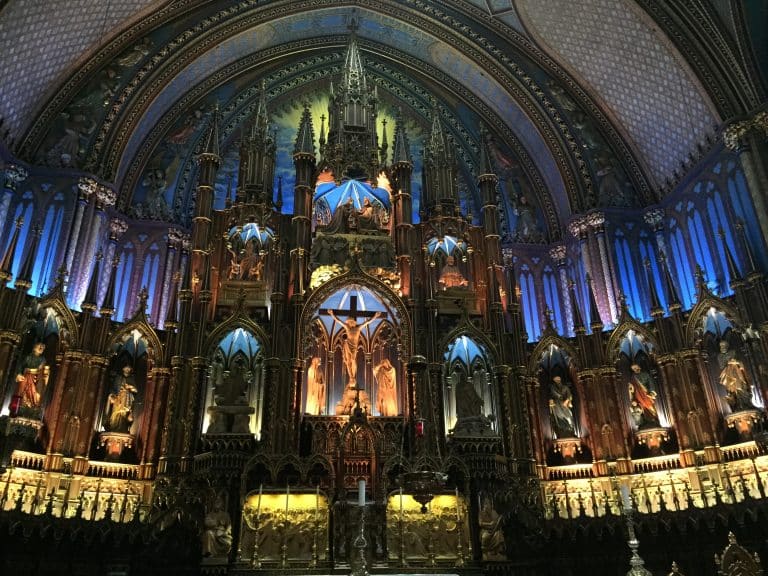Mormonism places a large amount of emphasis on rituals and rites of passages. When you’re a baby, you’re blessed. At age 8, baptism is expected. If you’re male, you’re ordained to the priesthood; but even for girls, entering and advancing through Young Women is a ritual. Then a mission is next–– 18 for men, 19 for women. The endowment and marriage are thrown in there sometime as well (both critical LDS rituals, on which exaltation is dependent).
But Mormons are far from being the only faith community that incorporates this form of worship. The Catholic Church has seven necessary rites and rituals, which they call the Sacraments. Those include baptism, the Eucharist (or Communion), and confirmation. Growing up, I had a sizable group of friends that were Catholic. I remember asking questions about their faith and practices with great curiosity, particularly the rite of Confirmation. It was a mixture of baptism, the sacrament, and the endowment all rolled into one awe-inspiring ceremony. My peers told me of dressing in white, walking up the aisle with hands folded reverently, taking the literal body and blood of Christ for the first time. As well, they took up themselves a confirmation name, usually the name of a revered saint. One Polish-Catholic friend in middle school chose for herself the name of Hedwig, a Polish saint. Of course, this was during the heyday of Harry Potter, and so there was a roll of the eyes when I first asked about her confirmation name. (Thinking about this now makes the similar LDS practice seem less foreign.)

Within Judaism, there is the bris–– or, ritual circumcision–– that takes place when a child is eight days old. More known to most people is the rite of having a bat or bar mitzvah where the initiate symbolically becomes an adult within the spiritual community. I remember attending a friend’s bat mitzvah and seeing her read from the Torah, afterwards walking around the room with the holy text, while the audience kissed it indirectly with a prayer book.
Mainline Protestants and other faiths, such as Islam, also have their own sacred rites and rituals through which participants show their devotion to their faith and worship God.
For me, sacred acts are how I best speak to God and how He best speaks to me. I was never completely comfortable with attending the Baptist church I grew up in. Nothing against their doctrine or practices, per se, but the freestyle form of worship used never spoke to me. Having the pastor give a sermon with spontaneous shouts from the congregation was inspiring, yes, but it didn’t provide a way for me to communicate with God. I loved the music and fierce devotion to God from my original spiritual home, but God never spoke to me there.
I suppose it’s why I always felt at home in the LDS temple. Ironically enough, the regimented and strict ceremony of the endowment provided the means through which Heavenly Father and I could communicate. After going through the nearly two-hour ceremony, it was while sitting in the Celestial Room that I was able to feel the Spirit the strongest. I didn’t write this post to explain why that is, only to explain that it happens. Likewise, I feel more at home during a Catholic service or Episcopal service (which borrows heavily from the Catholic ceremonies) than at, say, a Presbyterian or Methodist service. Giving the Sign of the Peace, seeing the reverend or priest lift up the sacramental bread and wine high above his or her head, the structured call and response…. the ritual and structure speaks to my soul. The symbolic clothing of the pastors and officiators shows me the language of God and teaches me the symbolism through which He speaks. I always felt most beautiful in my temple robes because I was clothed in symbolism through which God and Christ made their reality manifest.
After the recent LGBT policy change, however, I ended up handing back my temple recommend and taking off my garments. I knew it was the right thing for me spiritually (as I can’t lend my support or loyalty to an institution I currently feel is spiritually abusive and out of line), but I am still sad it had to come to that. I am sad I no longer feel solace in wearing my garments. I am sad that the temple is out of my reach now. The symbolism has been tainted by the “philosophies of man”. I can no longer fully concentrate or let the ritual speak to me, as I’ll now be distracted and off-put by current policy changes I feel are wrong. Wearing garments wouldn’t have their full meaning and power, as my anger and sadness toward the Church and its leaders wouldn’t allow me to truly appreciate them.
On the occasion that I do attend sacrament meeting (I consider myself less-active; not inactive, however, as I still attend every so often), I get a glimpse of the ritual that once spoke to me. I rarely pray or read scriptures because–– in my weird, twisted spiritual mind–– it’s too freestyle and loose. I happily pray with others as I see it as more structured and as I also feel the Spirit more powerfully with other people. Similarly, I love reciting the Lord’s Prayer in church services and reciting memorized scripture to myself that I do know. In any case, there is still spiritual ritual to be found that fulfills my needs.
Funnily enough, I only prefer regiment when it comes to spiritual matters–– secularly, I love going with the flow when I’m with friends or playing it by ear or being completely adaptable in situations. But when it comes to worshipping God–– perhaps because I lean more agnostically to their existence–– I need structure and lack of deviation. It forces to me to focus completely on worship without allowing my doubtful mind to wander.
Who knows if I’ll always find this form of worship an appropriate one; but for now, it allows me to believe and stay full of hope. Something I so desperately need.






7 Responses
Your faith is lovely to behold. Especially as I am the exact opposite. My life is all about structure and the only two places that is not true is creativity and spirituality. Which makes rituals less than fulfilling for me, but I love seeing what a different experience it is for you.
I really appreciate your feelings on this matter. In recent years, I’ve added a great deal more ritual into my own private spirituality. It helps me focus my mind and spirit so I am better able to hear and respond to the Divine.
I have almost the opposite disposition, as the more “freestyle” aspects of worship appeal to me most. It is interesting how learning styles can be so different.
I am so sorry the church has let you down this way. I had hoped things were getting better. This is so sad.
I love the way you explain the flux between faith and life, ritual and creative.
It’s heartbreaking when symbols of the love of Christ become symbols of judgement and rejection. I share your pain.
Thanks for sharing your spiritual journey here. I’m so impressed that your hope is still there. That makes me feel a little more hopeful myself.
This is beautiful, ERL. I also love the symbolism of ritual, and as a feminist, it has always puzzled me that I find so much strength in the temple. I cannot return either with this policy in place, but I cling to the imagery of a better world one day when you and I and all those who cannot currently attend could sit together in the Celestial Room.